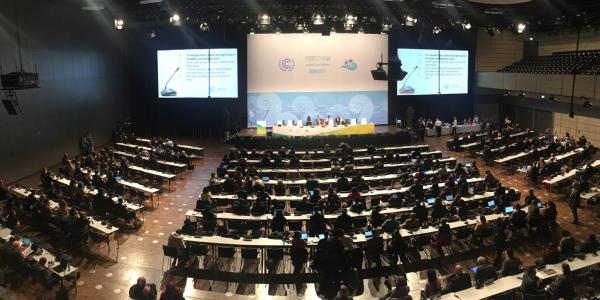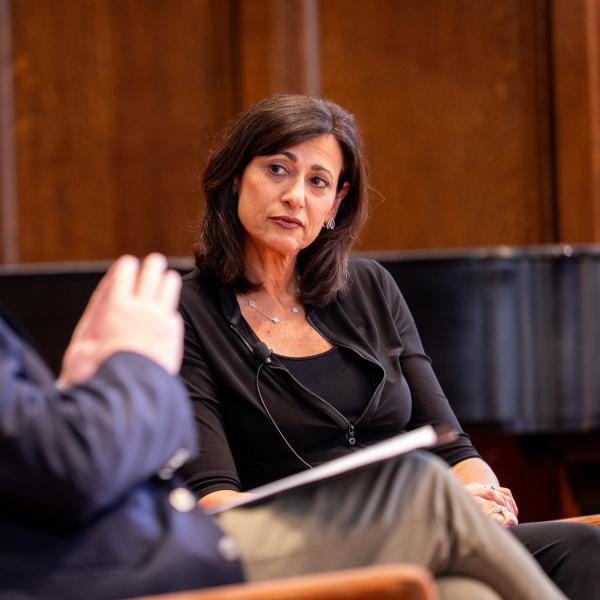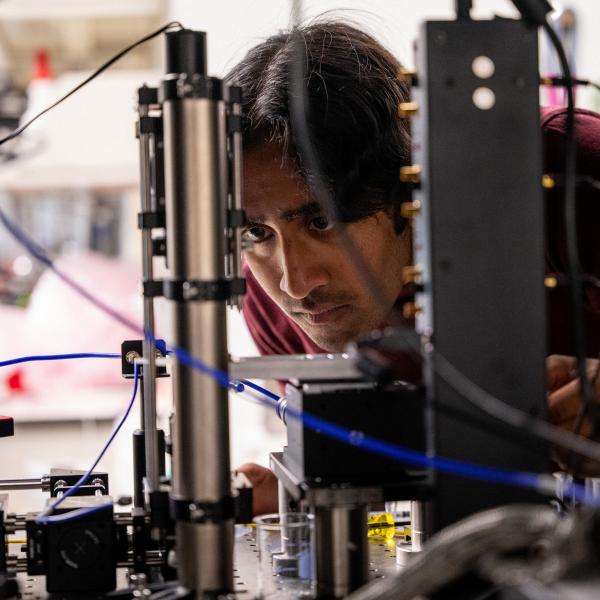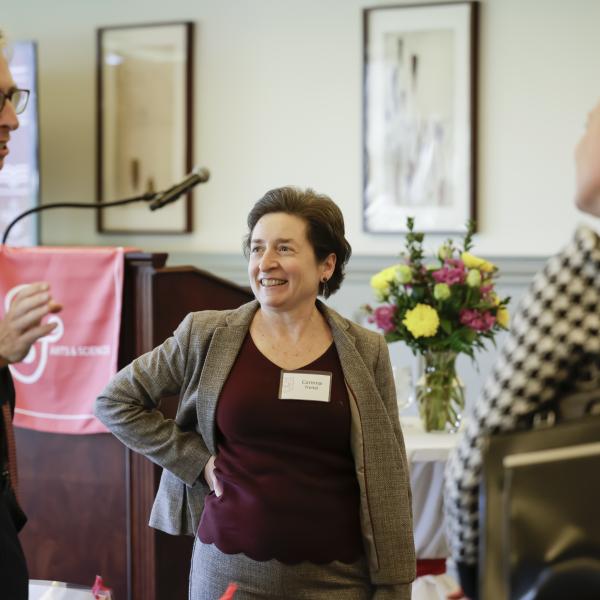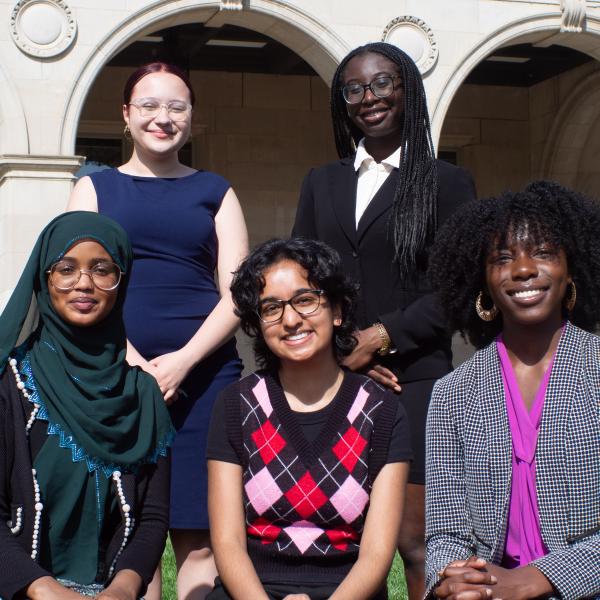For the ninth consecutive year, a select group of Washington University students will attend the Conference of the Parties, where they will observe global leaders discuss how to best respond to climate change. This year's conference will take place in Madrid.
This December, delegates from almost every country on Earth will meet in Madrid for the twenty-fifth annual Conference of the Parties (COP) to discuss climate change and negotiate plans to mitigate and adapt to it. For the ninth consecutive year, a select group of Washington University students will attend the conference as observers.
Under the umbrella of the United Nations Framework Convention on Climate Change (UNFCCC), the COP is the supreme decision-making body of the Convention, working to create and implement legal agreements such as the Kyoto Protocol and the Paris Agreement. The 1997 Kyoto Protocol includes legally binding emissions goals for developed countries, while the 2015 Paris Agreement relies on individual countries to determine their own goals, referred to as nationally determined contributions (NDCs).
WashU’s participation in COP started as a completely student-run initiative. Wanting to understand these important international negotiations, a group of undergraduates pushed the administration to apply for observer status with the UNFCCC, which allowed the students to organize themselves and attend COP in 2011. “To be in the presence of that much energy and that much convening power is an incredible learning experience,” said Seth Blum, who first attended COP while a sophomore at WashU in 2016.
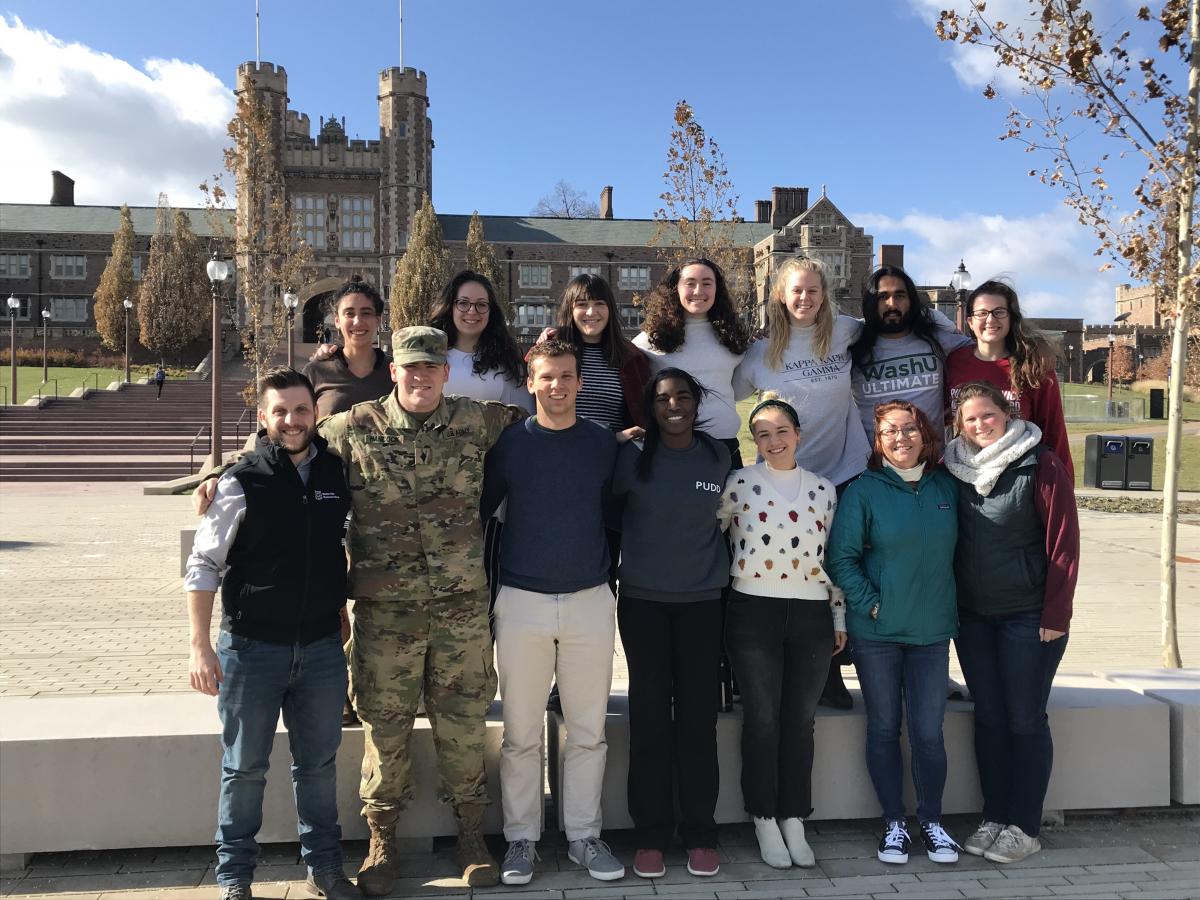
For several years, students continued attending as an extracurricular activity, but they soon realized that a curricular component would better prepare future students for the experience. They proposed the idea to Beth Martin, who enthusiastically supported it. “I saw it as sitting squarely in this area of experiential and engaged learning – learning by doing and seeing the intersection of science, technology, policy, and law,” said Martin. A senior lecturer in environmental studies and the interim director of the Washington University Climate Change Program, Martin taught the International Climate Negotiation Seminar as an independent study starting in 2013 and has taught it as a formal course each fall since 2016.
In the first part of the semester, the seminar covers the context of the UNFCCC, the Paris Agreement, and how COP meetings function in general. Then, the students divide into groups that focus on a narrower topic at the conference. This year, they are studying five areas: nationally determined contributions (NDCs); the global stocktake; the local communities and indigenous peoples platform; adaption and loss and damage; and the gender action plan.
With the NDCs, countries set forth what they will do in a concrete time frame to meet the international goals of the Paris Agreement. The global stocktake provides a framework for collectively assessing progress every five years, according to Noah Hagen, a senior who will attend this year’s COP. The global stocktake will examine “how we have reduced our emissions and how countries have adapted, and the first one is going to be in 2023,” Hagen explained. The goal is “a continuous cycle of becoming more ambitious.”
Hagen, who is majoring in mathematics with a minor in psychological and brain sciences, has taken several environmental studies classes and considers the Climate Negotiation Seminar a natural continuation of his interests. “Through working at the Office of Sustainability and through my interest in urban planning, I'm able to see a lot ground-level work on sustainability,” Hagen said. With the climate negotiations, “it's interesting to see the same issue of sustainability from the broadest possible perspective. We see from the top down what has to happen at the United Nations to make things possible on the local level.”
At COP, each WashU student sits in on various sessions related to their area of focus, taking notes that they then share online through the Research and Independent NGO Constituency (RINGO) website. Since the number of people who can attend a given session is limited, these notes allow people around the world to follow what is being discussed in the sessions. Additionally, the students post daily on Facebook with updates and perspectives about the negotiations.
Current and former students emphasized the uniqueness of WashU’s history of sending undergraduates to COP. Many universities in the U.S. that send observers to COP prioritize professors, administrators, and graduate students, in contrast with WashU’s policy to prioritize Martin’s students for its delegation.
Martin ensures that the students’ involvement extends beyond just attending the conference. Throughout the year, she and the students coordinate outreach efforts in St. Louis, connecting the international negotiations to issues in local communities. For example, they have spoken at a local mosque and at a meeting of the U.S. Green Building Council, and they have led mock negotiations at University City High School and as part of WashU’s summer college prep program.
After returning from COP, the students also help select the following year’s delegation, conducting interviews with applicants and making recommendations to Martin. In making these decisions, they prioritize an interdisciplinary delegation that reflects the multifaceted approach needed to combat climate change. This year’s delegation consists of Arts & Sciences undergraduates from a variety of disciplines, a doctoral student in anthropology, a business student, a law student, and two from the school of social work.
The graduate students this year are studying adaptation and loss and damage, providing capacity to Myanmar, which is designated by the UN as a Least Developed Country. The students will work with the delegates from Myanmar, enhancing their capacity through the development of background research that helps to focus Myanmar’s efforts at COP. Tracy Bach, an international environmental law professor and visiting professor in environmental studies at WashU, is leading this component. Bach and Martin serve as the co-focal points of the RINGO constituency, which represents Research and Independent NGOs that research and develop strategies to analyze the causes and consequences of climate change.
Ingrid Archibald, who graduated in May 2018 with majors in environmental policy and philosophy, mentioned that Martin's course helped her research the issues at stake and understand the context surrounding her specific area of focus, gender equity. Archibald attended the 2017 conference, where she witnessed firsthand the editing process of the gender action plan.
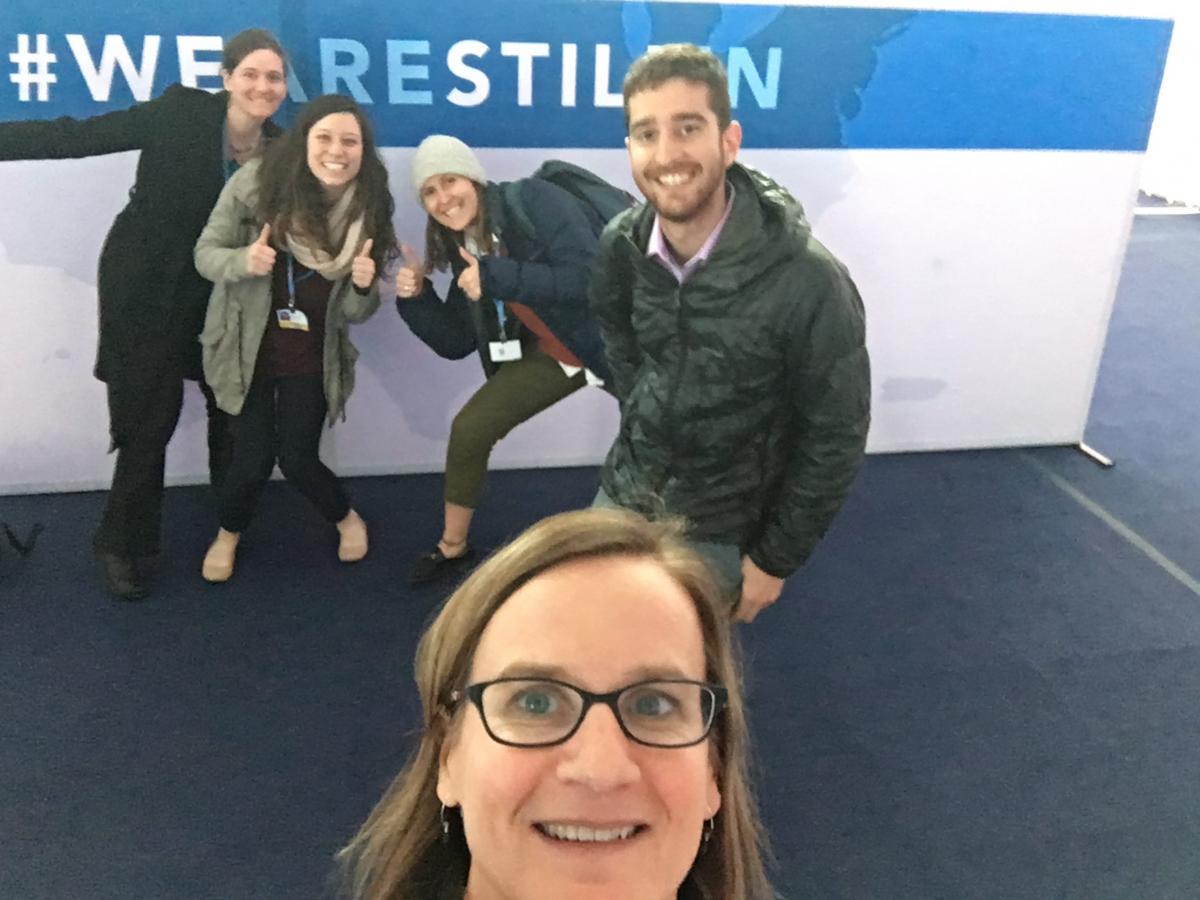
“The result was pretty substantial in terms of bringing gender into the UNFCCC’s internal processes, like having women attend the conference as delegates, and also in terms of addressing climate change in a way that pays attention to how climate change disproportionately impacts women,” Archibald said. For example, about half of the world’s farmers are women, but in many places, they are denied land ownership and other resources that male farmers have. As a result, female farmers are more vulnerable to agricultural problems created by climate change.
The students who attend COP have diverse career trajectories, but the experience of observing international climate negotiations impacts them all. It has proved especially pivotal for Seth Blum, a 2019 graduate with majors in international and area studies and mathematics. After attending COP, he landed an internship in the office of the U.S. Department of State that engages in UNFCCC negotiations. “There’s no way that would’ve happened without Beth [Martin] and the Climate Change Program,” Blum said.
Blum currently works at a nonprofit organization doing strategic planning related to the carbon market and adaptation, where he directly uses the skills that he gained through preparing for and attending COP in college. “Understanding the institutional dynamics and being able to write and research with those in mind is my job,” Blum said. “So for me the work that Beth does with undergrads has been foundational.”
Looking back on her experience at COP, Archibald vividly recalled “being in the same room as people whose country is going to sink within the next twenty to thirty years, whose communities are already being impacted. As a global community, we are failing these people,” she said. “Countries like the United States are just not doing enough to take action to mitigate climate impacts. That just felt incredibly frustrating and disheartening.”
At the same time, Archibald saw much that gave her hope: “Hearing about the incredible work that's happening all over the world and knowing that there are so many people who are devoting their lives to solving this problem was really inspiring to me.”
Hagen, who will attend this year’s COP, looks forward to spreading what he learns and encouraging other people to get involved. “I think education is important. It's important for kids to learn in school that climate change is not only real, but also it's solvable,” he said. “And the ways we can solve climate change can even make the world better. It’s an opportunity to improve ourselves.”
Student delegates to COP25 include: Dana Brown (graduate student, School of Law); Rex Davenport (MBA student, Olin Business School); Fiona Eckert (Environmental Policy and International and Area Studies, College of Arts & Sciences); Saransh Gothi (Environmental Biology, College of Arts & Sciences); Julia Greensfelder (Political Science and International and Area Studies, College of Arts & Sciences); Noah Hagen (Mathematics, College of Arts & Sciences); Canaan Hancock (Anthropology: Global Health and Environment, College of Arts & Sciences); Lizzi Kehoe (Women Gender and Sexuality Studies, College of Arts & Sciences); Erin Meller (College of Arts & Sciences); Sara Mesiano (Environmental Policy, College of Arts & Sciences); Caitlin Rankin (graduate student in Archaeology, Department of Anthropology, Arts & Sciences); Tamsen Reed (MSW/MPH student, Brown School of Social Work); Caroline Suppiger (Organization and Strategic Management, Olin Business School); Cassidy Sykes (Environmental Policy and Anthropology: Global Health and Environment, College of Arts & Sciences); Kailin Yin (Environmental Policy, College of Arts & Sciences, and Economics and Strategy, Olin Business School). For more information about the climate negotiations, visit https://sites.wustl.edu/wustlcop/ and https://www.facebook.com/wustlcop/. The WashU delegation receives support from Environmental Studies, the Climate Change Program, and the International Center for Energy, Environment and Sustainability.
